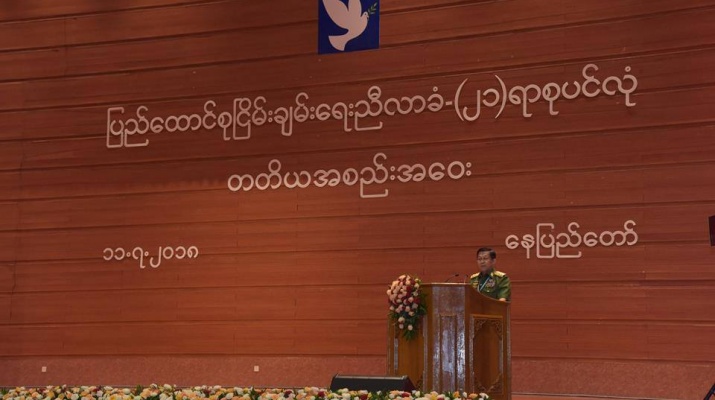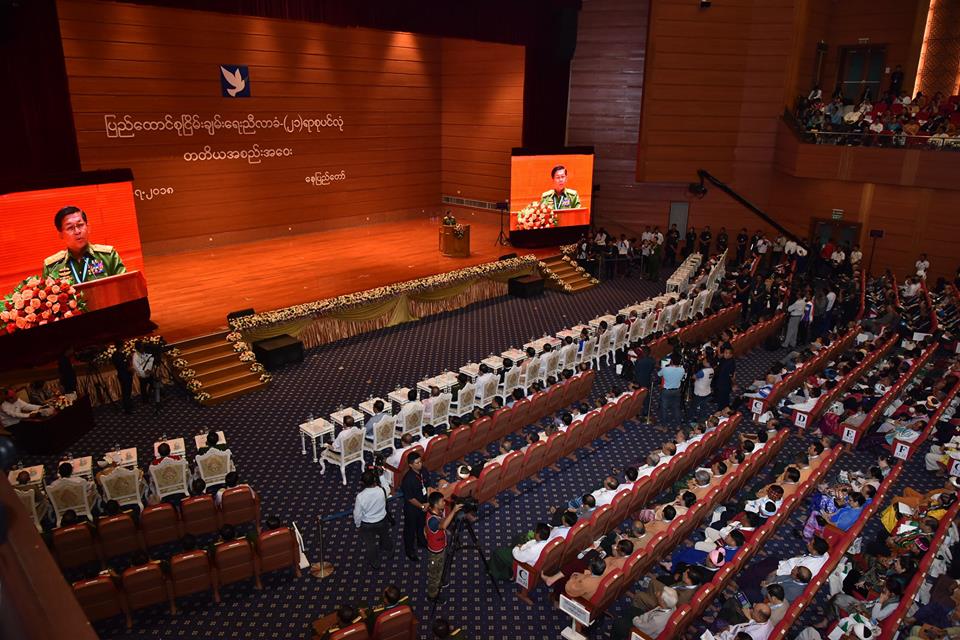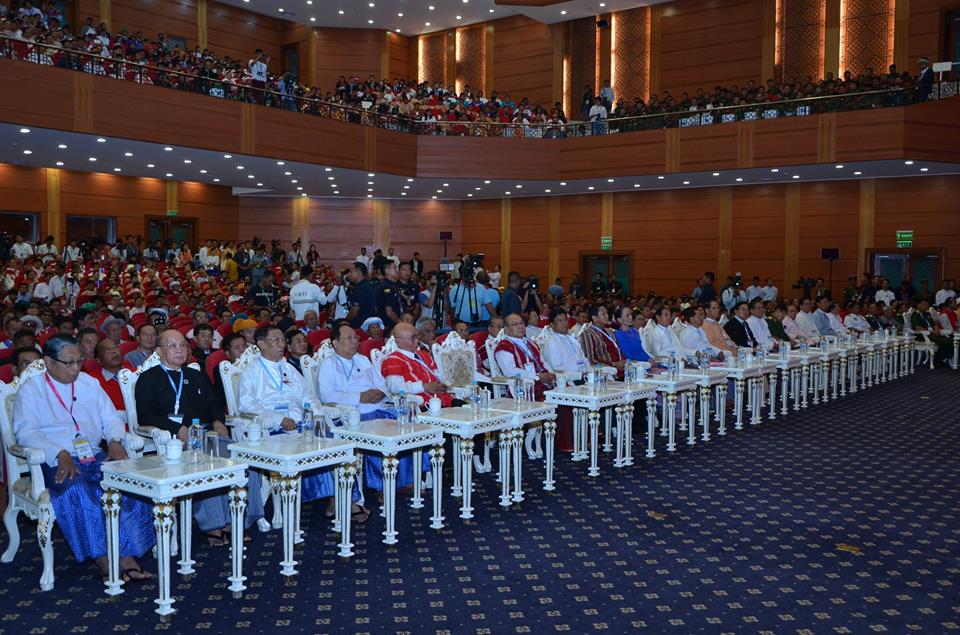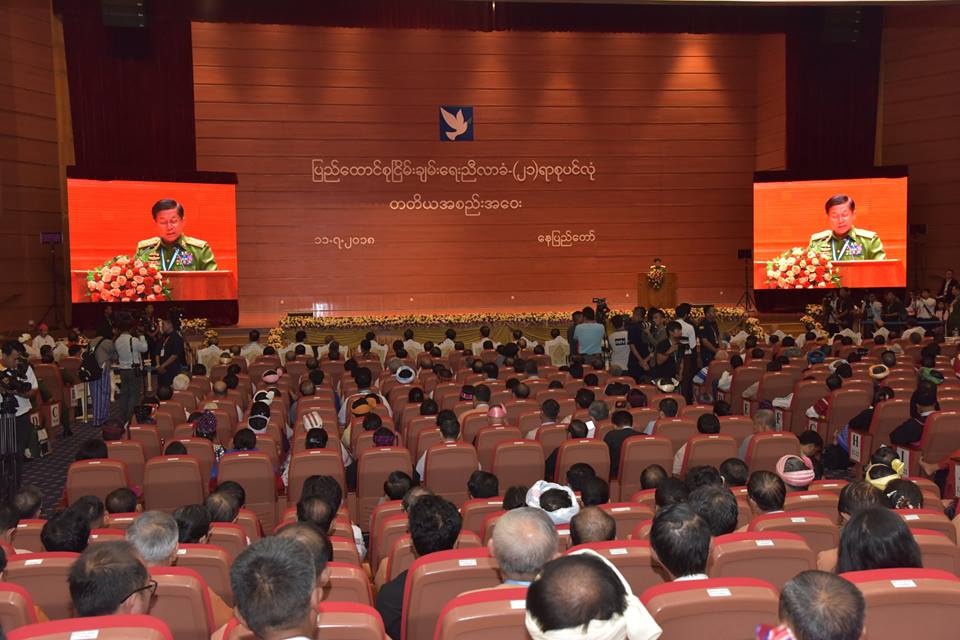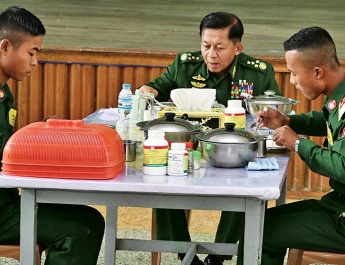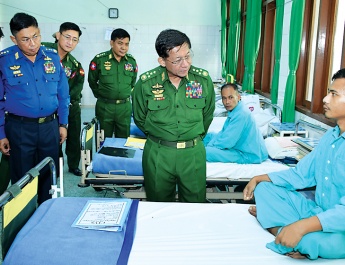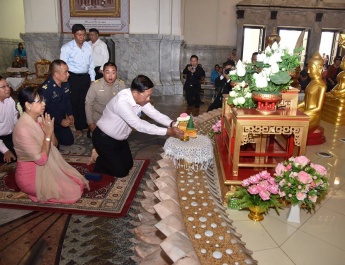Nay Pyi Taw July 11
Officials of the State, distinguished guests from the country and abroad and members of the relevant ethnic groups, I wish you all health and happiness.
First, I would like to express my pleasure and appreciation for your complete confidence in the peace process for attending the Union Peace Conference-the 21st Century Panglong (third meeting) which starts today and welcome representatives from all armed ethnic organizations.
Peace in other words is the invaluable shelter for every country and every race. Only a fine shelter will underpin a peaceful and stable human society, a pleasant life and a developing infrastructure. Although our country is rich in natural resources, we are still in need of the resources for peace. It is the objective condition we all can’t ignore.
We have a long history of independence struggle. Internal armed conflicts linger in our country alongside the long history of peace process. History is a mirror highlighting all the causes and all the good and the evil effects and consequences we had experienced throughout the past successive periods. If we look back the pages of history without any bias, we can see the plain truth of the past of our country. “We should not become a prisoner of history” which is a popular saying nowadays, warns us against harbouring hatred, resentment and bitterness, and teaches us to open a new chapter with new visions and new views after taking a lesson from the past. In accord with the theory of cause and effect, we must assess all the past events from the objective point of view.
A thorough look at the root cause of the ongoing internal armed conflicts of the country clearly shows that they were not ignited by the Tatmadaw but by the divide-and-rule policy adopted by the British colonialists during the colonial period and the political, ideological, racial and religious differences. The Tatmadaw has no big or small problems with any of the armed groups that appeared throughout the successive periods. Discontents and demands have surfaced only between the governments of the respective periods and the armed groups. All the brethren of our country have lived in togetherness in the same territory since time immemorial. The Myawady Stone Inscriptions were written in four languages including the ethnic languages of Pyu, Mon and Myanmar in addition to Pali in ME 474. The inscription of the three ethnic languages on a single stone slab stands witness to the fact that Myanmar has stood as a Union since yore.
At the time when the whole country fell under the rule of British colonialists, all the ethnic people started the independence struggle by fighting the wars with patriotic spirit for 10 years. During the period from the colonial era to date, our country has six constitutions and related laws.
The constitutions enacted in 1947, 1974 and 2008 are significant ones in Myanmar in the post-independence era. In the time of British colonialists, the Government of India Act, 1919 promulgated by the British Parliament, the Government of Burma Act, 1935 and the Constitution of Burma, Under Japanese Occupation (1943) were enacted in Myanmar. Among them, Myanmar was allowed to practise the diarchy administration on 2 January 1923 under the Government of India Act. However, it excluded Shan, Chin and Kachin regions from administration as an act of divide-and-rule policy. According to the Government of Burma Act, 1935, the governing system for Myanmar was upgraded to the 91 Departments Administration. However, the new administration system did not cover the ethnic regions but the divide-and-rule policy was continuously practised there. The divide-and-rule policy was implemented to rule the ethnic regions as Part I Scheduled Area and Part II Scheduled Area as the governor direct governing region and the governor’s representative governing region. Such administration was opposed by Doh Bamar Asiayone (We Burmese Association), which was the leading organization in independence struggle of Myanmar, starting from its conference held in Mawlamyine in 1938.
The divide-and-rule policy caused less development in ethnic regions and disunity among the states and mainland.
In implementing the white paper policy after Japan withdrew from Myanmar, British established the Frontier Area Administration to continuously instigate the ethnic regions. It was found that they made attempts of speeding up the instigation to leave ethnic regions from administration at a time when Myanmar regained her Independence. Practising the Frontier Crossing Act, they arrested and expelled the political activists not to communicate among the ethnic regions and the mainland of Myanmar for the political affairs. Consequences of divide-and-rule administration caused heavy impacts on holding the Panglong Conference to sign the Panglong Agreement. Up to now, its impacts still affect the nation. It is an inappropriate act to make fabrications to erase the armed conflicts based on integration of national unity and inequitable development caused by consequences of divide-and-rule administration on the pages of history and the start of integration of national unity and inequitable development after regaining the Independence.
After regaining Independence, Burma Communist Party went underground in March 1948 with opposing the policy of the then Anti-Fascist People’s Freedom League-AFPFL government led by U Nu to trigger the internal armed conflicts. Goshal, one of the communist leaders, compiled a paper to support the Pyinmana rebel area of Bo Tayar and Rakhine rebel areas of U Seinta and Bon Pauk Thar Kyaw and to designate these regions as liberation area so as to stimulate riots across the nation with the purpose of expanding their area. Policy differences happened between communists and AFPFL and between White Yebaw and AFPFL, and all groups made strenuous efforts to persuade the Tatmadaw to join them. General Ne Win, one main leader of the Tatmadaw at that time, did not accept it. Then, Kayin armed conflicts occurred with the aim of realizing the Kayin racial affairs and establishing the separate Kayin State. Moreover, Mujahid rebels in northern Rakhine State opposed and attacked the AFPFL government with the aim of establishing a separate state with religion since Myanmar has regained her Independence. The root cause of emerging KIO armed group in Kachin region where armed conflicts are happening up to now was based on religion which Union Party government led by Prime Minister U Nu promulgated Buddhism as State religion on 26 August 1961 and then the ethnic affair was emphasized. As remaining armed groups emerged due to politics, dogmatism, racism and religion, the criticisms, shaping that local armed organizations emerged and internal armed conflicts caused by the Tatmadaw are dangerous for peace processes. The acts of Tatmadaw are to protect the administrative mechanism of the government and to safeguard the life, property and interest of the public.
The successive governments of Myanmar did their best to end internal armed conflicts caused by divide-and-rule policy and different political, racial and religious ideologies, and achieve internal peace. There were both progress and failures. Our history can prove why we succeeded, why we failed, who we could make peace with and who we could not make peace with. But one thing I can clearly say is that the Tatmadaw made constructive efforts for safeguarding national independence and sovereignty and ensuring national unity and non-disintegration of the Union by actively participating in the successive governments’ endeavours to achieve internal peace. Regarding peace, it is necessary to explain in parallel with the history. In March and June in 1948 just after three or six months of Myanmar’s independence, internal armed conflicts emerged. As the earliest internal peace effort, the then AFPFL government issued a 15-point U Nu peace policy also known as 15-point left-wing unity policy. To implement the policy, Left-wing Organizing Council chaired by General Ne Win under the government’s leadership was established. In the Revolutionary Council era, the council made peace offer with all the underground armed organizations on 11 June 1963 for internal peace. It was the first step towards peace-making. The Tatmadaw led the peace effort. Under the Myanmar Socialist Programme Party government, internal peace effort was initiated in 1980 and peace talks commenced in 1981. Commanders of respective military commands had to actively participate in the effort. The government assigned duties to the Kachin State authoritative body led by the commander of Northern Command representing the government to achieve peace in Kachin State. After 1988 under the Tatmadaw government, the Tatmadaw led the peace efforts. Peace was made with 17 major ethnic armed groups and 23 small groups totalling 40. Under the President U Thein Sein government in multiparty democracy era, Notification (1/2011) was issued on 18 August 2011 to invite all ethnic armed organizations to peace talks. The invitation for peace mentioned the aim that the State is to build a peaceful, developed nation by upholding Our Three Main National Causes. The armed ethnic groups must accept Our Three Main National Causes. Talks started only after the clarification were made time and again on the non-separation and the election system which was the only principle way. Thus, all talks for peace need to follow the national interest of the Union. All committees including Union Peace-making Central Committee and various work committees comprised Tatmadawmen. They made effective cooperation. The Nationwide Ceasefire Agreement (NCA) was signed with ten ethnic armed groups.
Under the present National League for Democracy-led government also, the Tatmadaw has joined the Union Peace Dialogue Joint Committee (UPDJC) and joint monitoring committees at various levels. The Tatmadaw is doing its utmost for the success of the government’s peace process based on its experience. Our Tatmadawmen who have to fight in battlefields unavoidably are the ones who really want peace. I would like to say that the Tatmadaw want to achieve real peace as quickly as possible in such a way that cannot harm the Union, national unity, independence and sovereignty.
It is found that there are different views about peace agreements. Until 1999 since the time of the Tatmadaw government in 1989, 40 armed organizations made peace with the Tatmadaw government. In doing so, there were no exact and concrete contracts signed between the government and remaining organizations except KIO, KIA group. There were gentleman agreements only such as the agreements reached with each group on boundary limits for temporary stay and on regional development. The government had to try different peace-making ways such as ceasefire without giving up arms and the exchange of arms with peace based on the trust in the government. Some assume that they do not need to participate in the current peace-making processes as it has already reached the similar situation at that time. But they need to be aware of the fact that the time, situation and administrative system have changed now. In the past, the country was governed by the Tatmadaw alone. The Tatmadaw government alone steered every administrative mechanism. Now the country is governed under the multi-party democracy system aspired by the public. We need to have behaviours, practices and undertakings suited to the democracy system. The peace-making processes should be implemented based on democratic standards and the most-agreed points. These processes should not be different. As an advantage, the Nationwide Ceasefire Agreement (NCA) agreed by most of the groups has already been in place.
In December 2015, Union Parliament which represents the whole people unanimously approved this NCA in accord with democratic procedures. So, every ethnic armed group is to sign the NCA. Here I would like to point out the facts that no need to sign the NCA as there is no fighting and that the previous agreements have already existed may go against the current democratic ethics. The NCA is just a name used for a ceasefire agreement. But its essence is broader and more comprehensive. Even the first point of the fundamental principle of the NCA is to build a democratic federal union aspired not only by ethnic armed groups but also by other ethnic organizations. It is clearly seen that some signatories to the NCA made peace with the Tatmadaw government while others continued sticking to armed struggle at that time.
Bold steps must be taken without delay in implementing the peace process. If peace process takes longer than it is necessary, there will be instigation, interference and manipulation, all of which will undermine the hardly-built trust and hard-earned agreement. Therefore, I would like to urge the stakeholders to negotiate thoroughly with genuine goodwill during the conference in the interests of the State and national ethnic people. They must continue the talks till the sustainable peace result can be produced. I have often seen changes in the situations after the talks were halted before producing a solution. In this regard, I am urging all to hold the talks till reaching a result. I would like to urge in all seriousness that peace process be continued with consistency and be completed at the 2nd Union Peace Conference in 2020.
Stakeholders should be particularly aware that the government and the Tatmadaw are actively leading the peace process today not because we are weak, but because we are committed to interests of State and national ethnic people, and we want to end the armed conflicts which burn throughout successive periods, during our term, and build a modern, developed, united and strong, new democratic nation in accordance with the wishes of people. The sound of guns will become silent if all the groups with the true wish for peace observe the agreement. All must control their own men, instead of giving groundless reasons. In implementing the peace process, it is important to work with the notion that nothing takes precedence over peace. And it is important not to give priority to things that can lead to misunderstanding and not to drag things that have nothing to do with the peace process during this time. Armed ethnic groups in some regions cannot represent entire national people of 52 million, and political parties only represent a particular walk of life that supports them. Our Tatmadaw, being a people’s Tatmadaw born of ethnic people, is an organization representing the State and people. It is extremely important that they have legitimate reason for their existence and stances. We also know that there are desires for constitutional amendments in connection with peace talks. In 2015, 34 points of the Schedule Two under title of Region or State Legislative List of the 2008 Constitution and 20 points of the Schedule Five under the title of Taxes Collected by Region or State were mainly amended in the interests of national ethnic people, and the mandate of the region and state governments was expanded. Some might want more changes through continuous coordination if necessary. In so doing, action must be taken in accordance with provisions about Chapter 12 Amendment of the Constitution, and it is important that the 48 founding principles of the State remain intact.
In any country regardless of practising democracy or any other system, they have only one Armed Forces. Hence, the ethnic groups should work in accordance with the international peace principles. Currently, ending of armed struggle must be the top priority for establishment of a Union system based on democracy and federalism. It needs to make negotiations for future plans in accordance with democracy after the whole country achieves peace instead of taking time for unnecessary discussions.
I would like to reiterate that delaying the peace process is further drowning our country which is already lagged behind in development. The initial date for the conference is in the early 2018. But for various reasons it can be held today. We have a lot of work to do for the State and the public. We just shouldn’t talk the talk. We will reach nowhere just by choosing the best words for arguments. The strength of the nation lies within. All the national people are responsible for it. We all must be aware of the instigations to lessen our united strength. There is a saying that “we can move it if we push together”, but we don’t push enough to move it, our efforts are equal to “zero” if we measure with the yardstick of result. If you really love your country and your race, I would like to urge you to wipe out the civil armed conflicts that hinder the development of the country, and continue working toward that goal with goodwill. As the State is implementing the multi-party democracy in accord with the wishes of the people, all the organizations from regions and states must have equal rights under the Constitution in carrying out peace processes. I would like to note that we will place emphasis on coordination with neighbouring friend countries to have eternally peaceful border regions in building the Union based on democracy and federal system.
Guests and officials,
In conclusion, I would like to urge you not to put off, but try hard to successfully build absolute peace for establishing a new educated society flourishing with love for motherland, rationality, Union spirit and care for unity and delicacy; and hand it over to younger generations so that you can be proud of yourselves in accomplishing your historic duties and leaving behind a good legacy.


